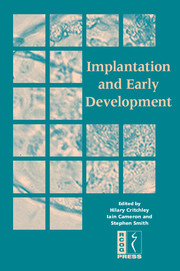Book contents
- Frontmatter
- Contents
- DECLARATION OF INTEREST
- Participants
- Preface
- SECTION 1 PREPARATION FOR IMPLANTATION – THE UTERINE ENVIRONMENT
- SECTION 2 THE EMBRYO
- SECTION 3 LESSONS FROM ANIMAL MODELS (TRANSGENICS) AND NOVEL TECHNOLOGIES
- SECTION 4 CLINICAL SEQUELAE
- 17 Sporadic early pregnancy loss: aetiology and management
- 18 Recurrent miscarriage – the role of prothrombotic disorders
- 19 Reproductive disorders and pregnancy outcome
- 20 Risk factors for first-trimester miscarriage: summary of results from the National Women's Health Study
- 21 Single-embryo transfer
- 22 Paediatric outcome after assisted reproductive technology
- SECTION 5 CONSENSUS VIEWS
- Index
19 - Reproductive disorders and pregnancy outcome
from SECTION 4 - CLINICAL SEQUELAE
Published online by Cambridge University Press: 05 June 2014
- Frontmatter
- Contents
- DECLARATION OF INTEREST
- Participants
- Preface
- SECTION 1 PREPARATION FOR IMPLANTATION – THE UTERINE ENVIRONMENT
- SECTION 2 THE EMBRYO
- SECTION 3 LESSONS FROM ANIMAL MODELS (TRANSGENICS) AND NOVEL TECHNOLOGIES
- SECTION 4 CLINICAL SEQUELAE
- 17 Sporadic early pregnancy loss: aetiology and management
- 18 Recurrent miscarriage – the role of prothrombotic disorders
- 19 Reproductive disorders and pregnancy outcome
- 20 Risk factors for first-trimester miscarriage: summary of results from the National Women's Health Study
- 21 Single-embryo transfer
- 22 Paediatric outcome after assisted reproductive technology
- SECTION 5 CONSENSUS VIEWS
- Index
Summary
Summary
The formation of a functional placenta is dependent upon highly coordinated interactions between the invading trophoblast and differentiating uterine tissues. In most species, the remodelling of the maternal tissues required for placenta formation, a process termed decidualisation, is triggered by the implanting blastocyst. However, in a handful of species, including humans, this decidual process occurs independently of pregnancy and is initiated in the secretory phase of each menstrual cycle. This raises the possibility that reproductive disorders that affect the preconceptual endometrial milieu predispose for impaired trophoblast invasion in pregnancy. Defective deep placentation, characterised predominantly by inadequate physiological transformation of the spiral arteries, is associated with a spectrum of feto-maternal complications, including miscarriage, pre-eclampsia, fetal growth restriction and preterm labour. In recent years, several large studies have shown that subfertile women are at increased risk of poor pregnancy outcome, thereby providing epidemiological evidence for a pathological link between reproductive disorders and pregnancy complications. However, the molecular defects in differentiating endometrium that predispose for poor trophoblast invasion are largely undefined. Furthermore, well-conducted, prospective, randomised trials are urgently needed to evaluate the efficacy of periconceptual medical intervention in the prevention of early and late pregnancy complications.
Keywords
- Type
- Chapter
- Information
- Implantation and Early Development , pp. 240 - 252Publisher: Cambridge University PressPrint publication year: 2005
- 1
- Cited by

